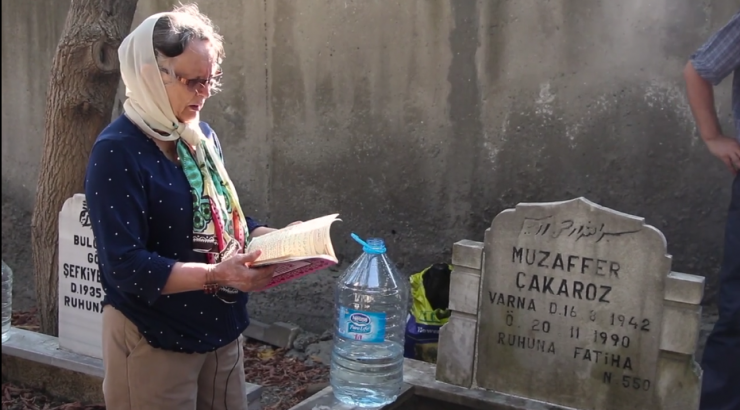“Will the personal things that are interesting to you also be interesting for others? Why would people be interested in my mother?”
Visiting family already feels like a chore, and when director Emir Cakaroz goes back to Turkey to see his mother, he turns his trips into full-fledged productions.
Titled after Cakaroz’s mother, Revza doesn’t let its camera get in the way of interacting with its subject. Cakaroz uses his mother’s unfiltered personality and daily chores as a mosaic of memories and present-day life in Turkey. A mostly hand-held camera captures Revza handwashing laundry and frying donuts or issuing stearn but loving criticisms about brushing one’s teeth and showing up late to dinner.
As filtered through its titular subject’s reminiscences, much of Revza is sad, but its joyous moments of familiarity are couched inside a foreign setting. We may not relate to reading Koran passages at a grave site, but Revza Cakaroz’s blunt advice and unabashed pride for her children feel imminently relatable.
Morose and moving all on its own, Cakaroz’s documentary is also the second chapter of a broader trilogy on the life of his mother. I talked with Cakaroz, who teaches in the film department at UW-Milwaukee, for our “5 Questions” series:
1. At what point in your visit home did you say “Oh, filming my mother’s interactions would be fun?”
Actually, I went to Turkey last summer intending to film. Revza is the second film of my mom’s trilogy and I have been working on the general concept of this project since 2009. The first film was Two Photographs which was screened at the Wisconsin Film Festival in 2012. It’s about the history of my family and my mom and it mostly focuses on the immigration of my family from Bulgaria to Turkey. Revza is about how my mom is doing now, 45 years after she immigrated to Turkey. For the third, I will take her back to Bulgaria to find her sister and brother, whom she hasn’t seen since 1971.
2. How judicious were you in editing, measuring your personal familiarity against what might make for a compelling piece of film?
I think this is the most difficult part of the personal documentary making process. Will the personal things that are interesting to you also be interesting for others? Why would people be interested in my mother? Revza is my fourth personal piece and when I make personal films I try to find universal themes that transcend specific cultures. I think a depiction of an intimate relationship between mother and son would be interesting in every part of the world, and this is what I tried to do.
3. I’m curious about the snippets you include of what’s playing on Turkish TV. The breast enhancement commercial is great just because of your mother’s reaction. Was leaving in the televised melodramas informed by your mother and father’s relationship in any way?
Revza also shows the life of a single woman in a patriarchal culture. To support this idea, I used TV segments to give a sense of being a woman in this culture. All these sections depict relationships between men and women. They show how women are treated by men, how men try to control the faith of women. Even breast enhancement product commercials are made by a man. I think that tells a lot.
4. As much as I laughed throughout this, your mother gets into some serious reflection. Were you prompting her in any way? How hands-off was your directorial approach?
I never told her do something for the camera. I tried to capture her daily life as much as I could. Because I was also part of her life, I included myself in the movie, too. Actually, when I give it a second thought, I can say it happened the other way around. My mom told me what I should film every once and a while. Because Revza was her second film, she was really aware of the filmmaking process and she had an idea of what would be good for a film. For example, she told me “I will go to visit my friends. Why don’t you come and film? That might be interesting.” Or she would say “You should film me when I sing and dance.”
5. At one point she says to you “You show us in such squalor.” Did your mother have reservations about representation, either for herself or for presenting her life as typical in Turkey? What does she think about “everyone in America” being able to see this?
Her main concern was that people are going to see how poor she is. She thinks people disrespect poor people and I’m sure she reached this conclusion based on her life experience. She thinks people are going to respect me less in America after they watch the film. She said my students will disrespect me and I will lose my job. She also said her grandson, my son Rafi, will not like her after she sees what kind of house she lives in.
I don’t agree. I think my son will love her more after he watches this film when he grows up and appreciate her life struggle. And hopefully I will keep my job.
- Revza plays as part of the “Barn Burners, Psychic Cats, and Turkish Delights” documentary program on Sun, Apr 17 at 4:00p in the Madison Museum of Contemporary Art.

